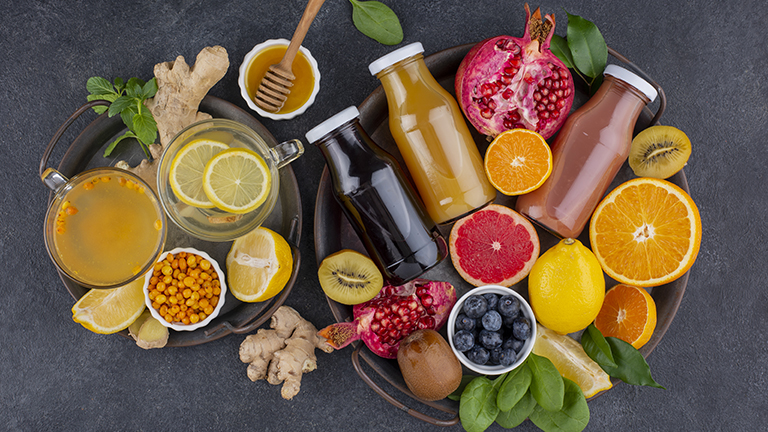Foods That Naturally Boost Collagen: Collagen is an important protein that supports your skin, hair, nails, and joints. Eating collagen-rich foods, such as bone broth, fish, citrus fruits, berries, and leafy greens, can improve the production of collagen, improve skin elasticity, strengthen joints, and more, promoting better health and youthful vitality naturally.
Introduction: Understanding Collagen and Its Importance
Collagen is an important protein which serves as the structural foundation for your skin, hair, nails, and connective tissues. As we age, collagen production decreases naturally, resulting in wrinkles, joint pain, and loss of elasticity in the skin. The good news is that there are foods that can aid in producing collagen naturally, so your body has the vitamins it needs for healthy skin and strong joints.
Top Animal-Based Foods That Naturally Boost Collagen
Animal-based foods are a good source of collagen, amino acids, and nutrients that promote collagen synthesis. This includes:
1. Bone Broth
Bone broth is extremely high in collagen, proline, glycine, and other amino acids. Regular consumption of bone broth may improve skin elasticity and joint health.
2. Chicken
Chicken has high amounts of connective tissues that are high in collagen. Using chicken from soups and stews is the best way to absorb collagen.
3. Fish and other marine collagen sources
Marine collagen is found in fish scales and skin, and has high bioavailability. Oily fish, like salmon and mackerel, may improve your skin’s hydration and elasticity.
4. Eggs
Egg whites contain a high amount of proline, which is an important amino acid for collagen synthesis.
Plant-Based Alternatives to Support Collagen Production
Although plant substances do not contain collagen itself, they will promote collagen synthesis by being good sources of nutrients like vitamin C, zinc, and antioxidants.
1. Citrus Fruits
Oranges, lemons, and grapefruits are all rich in vitamin C, which is needed to support collagen formation.
2. Berries
Strawberries, blueberries, raspberries, and most berries are good sources of antioxidants, which protect collagen from being broken down by free radicals.
3. Leafy Greens
Spinach, kale, and Swiss chard are great sources of chlorophyll, which promotes pro-collagen synthesis in the skin.
4. Nuts and Seeds
Almonds, walnuts, and sunflower seeds are good sources of zinc, copper, and essential fatty acids that also support collagen production.
Essential Nutrients That Aid in Collagen Synthesis
| Nutrient | Role in Collagen Production | Food Sources |
|---|---|---|
| Vitamin C | Helps synthesize and maintain collagen | Citrus fruits, bell peppers, broccoli |
| Proline | Essential amino acid for collagen formation | Egg whites, dairy, cabbage |
| Glycine | Supports collagen and connective tissue | Gelatin, meat, poultry |
| Zinc | Necessary for collagen production enzymes | Seeds, nuts, legumes |
| Copper | Supports collagen cross-linking | Shellfish, nuts, seeds |
| Antioxidants | Protect collagen from oxidative damage | Berries, green tea, dark chocolate |
Lifestyle Habits to Complement Collagen Intake
- Reduce exposure to sunlight while wearing sunglasses for recreational activities.
- Have a healthy diet rich in collagen-building foods.
- Drink plenty of fluids to maintain skin elasticity.
- Stay active to promote collagen production in connective tissues.
- Quit smoking, and avoid too much alcohol as they break down collagen.
Common Myths About Collagen
There are several myths about collagen:
- Myth: Only collagen supplements work.
Truth: Whole foods contain natural collagen, as well as the necessary cofactors to support collagen synthesis. - Myth: Collagen is mainly for skin.
Truth: Collagen supports joints, bones, blood vessels, and more. - Myth: Plant-based diets do not support collagen.
Truth: Plants high in vitamin C and amino acids are important contributors to collagen formation.
Expert Opinion
According to Dr. Jane Smith, a registered nutritionist, “Consuming a range of collagen-rich foods paired with vitamin C-rich fruits is a natural means of supporting collagen production, which is ultimately better than their use as supplements alone.”
The Nutrition Journal has also published research showing that eating bone broth and foods high in vitamin C enhances skin hydration and elasticity, and the benefits of this regimen are obtained as a result of consistency.
FAQ
1. Can foods high in collagen prevent wrinkles?
Yes, foods that promote collagen naturally can help improve skin elasticity and minimize fine lines.
2. Are collagen supplements better than food?
Whole foods are more holistic, providing a wider range of amino acids, vitamins, and minerals than isolated supplements.
3. How long does it take to see results from collagen foods?
Results vary, but as a general guideline, you may start to see noticeable improvements to skin and joint health within 6-12 weeks of consistent use.
4. Can vegetarians increase their collagen intake?
Yes, vegetarians can promote collagen production by eating fruits, nuts and seeds, and legumes high in vitamin C.
Conclusion: Building a Collagen-Boosting Diet Plan
An effective way to support youthfulness in skin, health in joints, and overall health and wellness, is to incorporate foods into the diet that promote collagen naturally. Using a combination of animal-based and plant-based foods with healthy lifestyle habits will provide your body with all of the nutrients it needs to stimulate collagen production.

